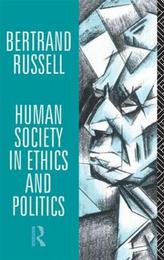
|
Human Society in Ethics and Politics
Paperback
Main Details
| Title |
Human Society in Ethics and Politics
|
| Authors and Contributors |
By (author) Bertrand Russell
|
|
Introduction by John Slater
|
| Physical Properties |
| Format:Paperback | | Pages:248 | | Dimensions(mm): Height 216,Width 138 |
|
| Category/Genre | Ethics and moral philosophy |
|---|
| ISBN/Barcode |
9780415083003
|
| Classifications | Dewey:170 |
|---|
| Audience | | Undergraduate | | Postgraduate, Research & Scholarly | | Professional & Vocational | |
|---|
| Edition |
2nd Revised edition
|
|
Publishing Details |
| Publisher |
Taylor & Francis Ltd
|
| Imprint |
Routledge
|
| Publication Date |
21 May 1992 |
| Publication Country |
United Kingdom
|
Description
In this book Russell gives a logical analysis of ethical concepts and principles. He goes on to relate his ethical conclusions to politics and religion. It is his only extended statement of his later views on ethics.
ReviewsKirkus Review US:With the world and history as his laboratory Bertrand Russell sets out again to find solutions for the dilemmas of modern society in terms of education and a scientific attitude. Under these, all courses of action other than those destined to promote the most happiness, are reduced to the ridiculous. Basically hopeful and emotionally sound, his hypothesis can be boiled down to this: that man can be educated so that his desires will be "compossible" i.e., able to be worked out in conjunction with each other. To illustrate, the first part of the book is the establishment of a code of ethics, the midpoint between impulse and control, and the second is the implementation of this code in political life. Carefully analyzing sources and alternatives, Mr. Russell probes the many fields from which we draw our convictions ?? belief and feeling; moral codes and their defects; good and bad, and the irrationality of partial good; obligation; sin; the facts of emotion that make the body of ethical knowledge and the satisfaction resulting from the carrying out of a good desire. Applying his conclusions to politics there is a statement of politically important desires- shelter, acquisition, rivalry, vanity, power- the last four being rationally invalid. Stemming then?? from the hypothesis that man needs intelligence fostered by education, his conditions for peace number world government, a lower birth rate, diffusion of prosperity and room for individual initiative. The rival camps of communism and the "free world" could take the first steps by allowing a free flow of facts to lessen suspicion- and if readers can only shake their heads in a forlorn hope that these things will come to pass, at least the ideas have been restated. (Kirkus Reviews)
|